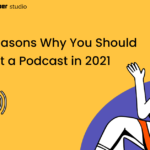If you have just started your podcast and are still figuring out your way around it then you are bound to make mistakes. Even podcasters with experience can make mistakes and it’s all part of the learning process.
Podcasting is an ever evolving space. As the industry is growing, there are new technologies, unique strategies and tactics that creators and podcast companies use every other day. As you start your podcast, you’ll discover new facets that you are not familiar with and make some mistakes on your way. The good news is that you can learn from those mistakes and from experienced podcasters who have already gone through this phase.
In this blog, we’ll share top 10 common podcasting mistakes that creators often make. Learn from them so that you don’t make the same mistakes. This will help you in saving your time and efforts that you can utilize in the right place.
#1 You have unrealistic expectations
The biggest mistake you can make in the beginning stage of your podcasting journey is to have unrealistic expectations from yourself and your podcast. When you have high expectations, you focus more on the outcome – the result. This drives you away from the real factor that makes your podcast a success – hard work and consistency.
In the initial stage, your focus should be on creating high-quality content. There are many podcasts out there. To make your own name, it will take some time to get used to the low listens and downloads in the beginning. As you spend more time creating content and objectively understanding your data analytics, you’ll notice what’s working for your podcast and what’s not.
This doesn’t mean that you shouldn’t have dreams and aspirations. What you can do is set realistic short-term and long-term goals for your show. This way, you will work towards those goals and not just get successful overnight.
#2 You don’t know your niche or you have chosen a broad topic
If you don’t know your niche, you will have a hard time creating quality content and charming the audience. The best way to attract and retain a loyal audience is through niche topics. That is because people relate more to a specific topic than a broad topic. If you have trouble finding a creative niche podcast topic, brainstorm some ideas that you can speak about as an expert. Once you know what you want to talk about, consider that topic as an umbrella under which you have various subtopics.
It might not seem like it but a broad podcast topic will do more harm than any good. You might think that a broad topic means more things to talk about but that’s not true. It only leads to unorganized content. Also, if you don’t have a niche, then you won’t know who you are addressing in your podcast and who your listeners are.
Having a niche topic will help you stand out from the herd of other general podcasts. You can also put your own spin on such a topic and create a more engaging show. For instance, you are creating a podcast to educate moms. Now that’s a very broad topic. To make it more relatable to your audience, you can look at narrowing down to working moms. To make it more niche, you can podcast about how working moms – who are used to juggling between being in office and looking after their kids – can now handle parenting while working from home, during the pandemic.
#3 You don’t know your target audience
Most of the mistakes stem from this one – not knowing your target audience. It’s pretty obvious but still, a lot of creators make this mistake. If you don’t know your target audience, the whole point of your podcast is zilch, zero, nothing at all.

When you practice archery, you need to know where the target is. If you don’t know your target, how will you aim towards it? You’d be pointlessly aiming for the sky. The same goes for your podcast target audience. Without the knowledge of your audience, you won’t know how to create relevant content or where and whom to promote your podcast to.
To figure out your target audience, do some introspection. What is the age group of your audience? Where do they come from? Are they students or are they a working lot? Consider their gender, their background and everything that could give you a better understanding of them so that you can create content accordingly.
#4 You are not marketing your podcast
This mistake applies to all sorts of content and in every industry. No marketing means that the content is non-existent. In an era where social media platforms act like their own search engine, not promoting your podcast on these platforms and every other possible place is a huge mistake.
If you have created a podcast, you have to share it with people and get it noticed. Just submitting your podcast to directories won’t be enough to get it discovered. Treat marketing as a major source of building your loyal audience base. Start with promoting your podcast on social media. Build your email list and invest your time in establishing your presence on every platform where your audience is hanging out. In this digital era, marketing has become easy and accessible to all and you need to use it to your advantage.
#5 Your audio is not good enough
One thing that you cannot compromise within your podcast is your audio quality. No matter what fancy tricks and campaigns you pull for your podcast, your listeners will be out of the door if your audio is not good enough.
Podcasting is all about creating an intimate connection with your listeners through audio. If your audio is not satisfactory, then you will fail to connect with your audience. This doesn’t necessarily mean that you have to get expensive equipment. Your laptop and earphones can make for decent equipment. Remember to record your audio in 320 kbps which is considered good audio quality. Small things like recording in a silent room with no background noise will also help.
Another thing you should practice is leveling your audio. This means that your episode should be audible in a consistent manner. Suppose you create an interview episode. You throw in an intro and outro along with your and guest’s audio file. Let’s add more background music to it. It might be possible that they all have different volume settings. Leveling your audio helps you make the audio smooth, so there are no segments suddenly blaring into your listeners’ ears, creating a bad experience.
#6 You are not engaging with your audience
Even though you are talking to your listeners in the episode, it is still very one-sided. You need to engage with them in real-time, outside your podcast. Audience engagement is crucial as it helps you understand your audience better and build your listener community around your podcast.
The most common place to connect with your audience is social media. You can create Facebook groups and Twitter spaces to hold interesting conversations with your listeners. Engage with them in the comments and do live streams on Instagram and Facebook to have a real-time conversation with them. Use your email list as another way to connect with them by sending a weekly newsletter and engaging emails.
Your aim is to create a close connection with your listeners and build a loyal audience base.
#7 You are not consistent

Consistency is the key, no matter what content field you are in. Efficient and successful podcasting is a result of achieving short-term and long-term goals. Consistency helps you in meeting those goals.
You have to create regular content and publish it on time. You can manage your content by creating a proper schedule and publishing your podcasts on time. That way you will have the deadline in the back of your mind and it’ll push you towards being productive. It also helps in organizing your content and makes you more disciplined as a creator. You can also try scheduling your marketing activities, as that’s another essential part of your podcasting.
#8 There’s no solid call to action
Beginning and ending an episode abruptly with no proper start or end prompt can be a grave mistake. It would help if you always start your episode with a good prompt to set the vibe. The same goes for ending prompts. A call to action is a good way to tie up your episode.
CTAs are not just for sponsored products. You can also ask your listeners to subscribe to your podcast and share it with others. This is a tactic to lead a listener to a specific action that will be to your advantage. You can also ask them to drop your social media profiles to connect with you.
#9 You are not building a feedback loop for your audience
Feedback from your audience helps you understand where you are lacking and what you can do to improve your podcast show so that it’s more fun for listeners. Not creating a feedback loop will drive you away from helpful insight.
You can create Twitter threads or share Google forms with your email list, asking for some feedback. You can also educate them on how to give good feedback and specific parts you want them to focus on. The comment section of your social media is another place where you can look out for good feedback.
#10 You are not interconnecting your content mediums – Instagram, YouTube and Podcasts

As we said at the beginning of this article, the podcasting space is ever evolving, where content is always taking new shapes and forms. A new way to be efficient with your content is to connect your content mediums. Creators these days have their YouTube, Instagram, and podcasts connected to one another. If you’re not doing the same, then you are making our last mistake.
Connecting your various content funnels helps you create a diverse community of your own. It also opens doors to repurposing content and maximizing your reach. Establishing yourself on a single platform is not enough in today’s time. You have to create your presence everywhere as efficiently as you can to have your own close-knit network.
Closing Thoughts
We learn from our mistakes. Avoid those you can and learn from those you’ve made in the past. Assess your current podcasting habits and the way you curate content. Look out for places where you can improve. Keep up with the current trends and practices in the podcasting industry. Keep in mind these 10 common podcasting mistakes that you should avoid in 2021.




